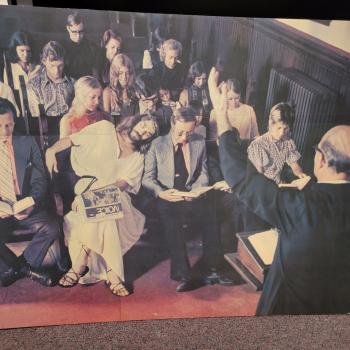 I intend soon enough to do a full review of Peter Leithart’s interesting book Defending Constantine but for now, I want to focus on one aspect of his approach to religious matters that deserves closer attention. When Constantine had gained power, beyond his military command, he and Licinius issued a proclamation now called the Edict of Milan. This was an important edict of what we would call religious tolerance, and it set in motion a situation in which there would be no more persecution of Christians, for a start, but in fact it said a good deal more. It suggested that the Biblical God was the supreme God who should be worshipped, and that other views would be tolerated, but not preferred by the Empire’s rulers, hence religious tolerance.
I intend soon enough to do a full review of Peter Leithart’s interesting book Defending Constantine but for now, I want to focus on one aspect of his approach to religious matters that deserves closer attention. When Constantine had gained power, beyond his military command, he and Licinius issued a proclamation now called the Edict of Milan. This was an important edict of what we would call religious tolerance, and it set in motion a situation in which there would be no more persecution of Christians, for a start, but in fact it said a good deal more. It suggested that the Biblical God was the supreme God who should be worshipped, and that other views would be tolerated, but not preferred by the Empire’s rulers, hence religious tolerance.
Following the lead of Elizabeth Digeser, Peter Leithart sets up a threefold paradigm meant to locate Constantine and explain his religious policies (pp. 139-40). The paradigm distinguishes between forbearance, tolerance, and concord, with Leithart suggesting that ultimately and in the end Constantine’s practice tended towards the latter of these three. Forbearance is a mere pragmatic policy not guided by moral principle, and when the going got rough politically, it could give way to a policy of persecution.
Toleration by contrast involves a moral principle such as the notion that a person’s religious views cannot or should not be coerced in some particular direction by civic authorities. Note however that ‘toleration’ on this model does not mean equality and does not mean acceptance. I stress this because too often the term ‘toleration’ in modern American discourse does not mean what the dictionary say toleration means, namely an unwillingness to take action against something you disapprove of and disagree with because you think suppression of it is a violation of some religious right or privilege. Toleration means toleration, putting up with, not consent or approval. In modern American discourse the term has come to mean something else entirely and something more than ‘live and let live’. Tolerance whether in political or ethical or theological debates on hot topics is often a buzz word for ‘acceptance of something as legitimate as a viable moral option’. This is particularly true in the homosexuality debate, but also in other current debates as well.
The third, and most important category when it comes to Constantine is ‘concord’. Concord is a policy in which by treating some one or some group with forbearance and tolerance you believe you are creating an ethos or certain conditions under which the one’s tolerated may see the light and freely change their behavior, in this case to what the State expects. Leithart stresses that this third approach is in fact what was Constantine’s policy.
This explains why on the one hand he clearly favored Christianity, constructed many churches, and even banned pagan sacrifice in some limited situations and senses (which btw is banned today as well in most States in tolerant politically correct America as well) but on the other hand, Constantine did not tear down all pagan shrines, forbid various forms of pagan worship, nor did he withdraw all funding from the same. Constantine, as Leithart shows time and again, was not the religious dictator imposing Christianity on one and all that he is so often portrayed to be. He was a committed Christian however, in a 4th century sense of the term. More on this in due course.
My question that comes out of this discussion is— How should Americans, and perhaps especially our President approach the issue of religious tolerance? It seems clear enough to me that on the one hand, considering the drift away from our Judaeo-Christian roots of government in some respects, that we could not and should not expect to have a President like Constantine, especially in view of the Bill of Rights including freedom of religion as a moral principle of the state. On the other hand, there is no reason why we could not rightly expect to have a President who is a committed Christian, favors that religion, is happy to give tax breaks to churches and other charitable organizations, while at the same time, like Constantine, not de-funding other legitimate well established religious groups. Tolerance in this model, again, does not mean consent or agreement, it means tolerance. This is not the same thing as someone saying ‘all world religions are equal paths to God and equally legitimate’.
Think on these things.
















